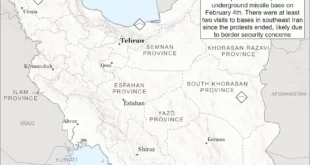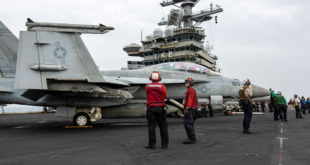 TEHRAN (FNA)- The warlike stance of the US guarantees that it will never accomplish its desired results against Iran, a top Iranian commander said.
TEHRAN (FNA)- The warlike stance of the US guarantees that it will never accomplish its desired results against Iran, a top Iranian commander said.
The United States has devised a scheme and hopes that it will allow its eventual engagement in a war with Iran, Islamic Revolution Guards Corps (IRGC) Air Force Commander, Brigadier General Hossein Salami, was quoted by press tv as saying on Saturday.
He was referring to the US invasion of Iran’s neighbors to the east and west, Afghanistan and Iraq.
The Bush administration accuses Tehran of fueling instability in its neighboring countries, under the pretext of which it has sought to justify a prolonged military presence in the two occupied states. While Washington has failed to provide concrete evidence in support of the claims, it has been successful in shifting the focus of the international community from issue to issue to portray Iran as a regional threat.
The most controversial issue attributed to Iran is its nuclear program. The United States and its allies accuse the Non-Proliferation Treaty signatory of pursuing nuclear weaponry. The United Nations nuclear watchdog, however, has declared that Iran enriches uranium-235 to a level of 3.7 percent. Nuclear arms production requires an enrichment level of above 90 percent.
Washington has a long history of aggression toward Iran but intensified its anti-Iran efforts after the victory of the Islamic Revolution in 1979. The White House threw its weight behind such internationally banned terrorist groups as the Mojahedin-e Khalq Organization (MKO) and helped Iraqi dictator Saddam Hussein in the production of weapons of mass destruction after the Iraqi invasion of Iran in 1980.
In response to US efforts in the region and its recent war of words against Iran, Brigadier General Salami has promised that White House officials will never fulfill their “imperialist” plans against Tehran.
“They have never and will never achieve their desired result against the Islamic Revolution.”
He also pointed to the recent Iranian military maneuver and said that the drill prompted a reversal in the longstanding US political strategies in the region.
“Iran’s military maneuver caused a dramatic reversal in Western political stance. Despite all the threatening remarks of Western officials, the maneuver helped Iran once again prove itself as a regional power,” said the Iranian official.
Iran held talks in July on a package of incentives drawn up by the five permanent members of the UN Security Council plus Germany that required a suspension in Iranian nuclear work in return for political and economic benefits. A package of solution to global crises proposed by Tehran was also discussed.
Various Washington officials dubbed the talks as a “U-turn” in US policy toward Iran, as Washington sent a senior envoy to the nuclear talks with Iran for the first time.
Despite Washington confirmation that US participation would be a “one-time” offer limited to “listening” rather than “contributing”, Iran has described the move as positive due to Washington’s retreat from its previous position – that it would not negotiate with Iran unless it suspended its enrichment activities.
Iranian President Mahmoud Ahmadinejad responded in late July that Iranians would see the White House in a “positive” light if Washington shows commitment to adopting a new approach toward Tehran. His remarks were seen as a signal of Tehran’s openness toward relations with the US.
“Today, we see new behavior shown by the United States and the officials of the United States. My question is, is such behavior rooted in a new approach?” he asked in an NBC interview.
If so, “we will be facing a new situation and the response by the Iranian people will be a positive one,” Ahmadinejad promised.
 Eurasia Press & News
Eurasia Press & News



